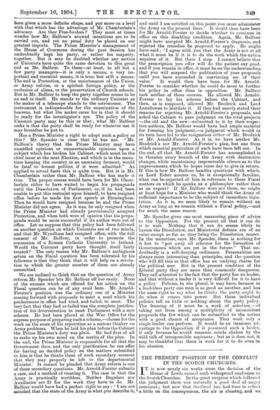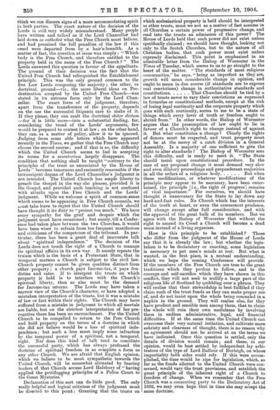THE PRESENT POSITION OF THE CONFLICT IN THE SCOTCH CHURCHES.
IT is now nearly six weeks since the decision of the House of Lords caused such widespread confusion in the Scotch Churches. In the great surprise which followed the judgment there was naturally a good deal of angry comment ; but now that Scotland has had time to reflect a little on the consequences, the air is clearing, and we think we can discern signs of a more accommodating spirit in both parties. The exact nature of the decision of the Lords is still very widely misunderstood. Many people have written and talked as if the Lord Chancellor had laid down ex cathedrd what the Free Church must believe, and bad promised the full penalties of the law if this creed were departed from by a hair's-breadth. As a matter of fact, the question at issue was simply : "Which body is the Free Church, and therefore entitled to the property held in the name of the Free Church ? " The Lords answered this question in favour of the appellants. The ground of their decision was the fact that the United Free Church had. relinquished the Establishment principle. This was the only ground common to the five Law Lords composing the majority ; the other, or doctrinal, ground—viz., the more liberal ideas on Pre- destination accepted by the United Free Church—was stated in its extreme form only by the Lord Chan- cellor. The exact force of the judgment, therefore, apart from the transference of the property, depends on the use the successful litigants care to make of it. If they please, they can exalt the doctrinal °biter dictum —for it is little more—into a substantial finding, for, considering the trend of the Lords' arguments, few would be prepared to contest it at law ; on the other hand, they can, as a matter of policy, allow it to be ignored. Judging from some able letters which have appeared recently in the Times, we gather that the Free Church may choose the second course; and if that is so, the difficulty which the United Church seems to feel in accepting its terms for a moratorium largely disappears. The condition that nothing shall be taught "contrary to the principles of the trust as enunciated by the House of Lords" becomes innocuous and eminently reasonable if the intransigent dogma of the Lord Chancellor's judgment is not intended. The United Church has ample liberty to preach the Gospel in the way she pleases, provided it is the Gospel, and provided such teaching is not confused with attacks upon the Free Church and the Lords' judgment. While we welcome a spirit of common-sense which seems to be appearing in Free Church councils, we Lust take leave to regret that the United Church should have thought it its day to "protest too much." We have every sympathy for the grief and despair which the judgment must have occasioned ; but surely, till a Confer- ence had taken place between the two Churches, it would have been wiser to refrain from too frequent manifestoes and criticisms of the competence of the tribunal. In par- ticular, there has been a great deal of inaccurate talk about "spiritual independence." The decision of the Lords does not touch the right of a Church to manage its spiritual affairs in its own way. It merely repeats the truism which is the basis of a Protestant State, that in temporal matters a Church is subject to the civil law. Church property cannot be given qualities distinct from other 'property ; a church pays Income-tax, it pays feu- duties and rates. If to interpret the trusts on which property is held is to interfere with the Church's spiritual liberty, then so also must be the demand for Income-tax returns. The Lords may have taken a narrow view of the Church's character, or have adopted a mistaken interpretation of the trusts, but it was a mistake of law or fact within their rights. The Church may have suffered from a ,mistake in judgment to which all mortals are liable, but on the strictest interpretation of her pre- rogative there has been no encroachment. For the United Church to be compelled to return to the Free Church and hold property on the terms of a doctrine in which she did. not believe would be a loss of spiritual inde- pendence; but such a loss must imply some infraction by the temporal power of a spiritual, not a temporal, right. Nor does this kind of talk tend to conciliate the successful party, which has always professed the doctrine of spiritual freedom in as complete a form as any other Church. We are afraid that English opinion, which we believe to be most sympathetic towards the United Church, will be somewhat alienated by hearing leaders of that Church accuse Lord Halsbury of "having applied the pettifogging principles of a Police Court to the Great Mysteries.'
Declamation of this sort can do little good. The only really helpful and logical criticism of the judgment must be directed to this point : Granting that the trusts on which ecclesiastical property is held should be interpreted as other trusts, must we not as a matter of fact assume in all Churches a certain power of progressive change, and read into the trusts an admission of this power ? The House of Lords held that such power did not exist unless specifically claimed; we should have thought, looking not only to the Scotch Churches, but to the nature of all Christian bodies, that such power must exist unless expressly disclaimed. This point is emphasised in an admirable letter from the Bishop of Worcester in the Times of Tuesday, which seems to us to go straight to the heart of the matter. "The standards of most religious communities," he says, "being as imperfect as they are, growth will mean considerable change in opinion, and ought to mean in due course (if standards are to express real convictions) change in authoritative standards and constitutions That Churches should be tied by a law of trusts never to vary their convictions as expressed in formulas or constitutional methods, except at the risk of losing legal continuity and the corporate property which goes with such continuity, seems to me to be a state of things which every lover of truth or freedom ought to shrink from." In other words, the Bishop of Worcester argues that the presumption of law ought to lie in favour of a Church's right to change instead of against it. But what constitutes a change ? Clearly the rights of donors must be respected, and trust property must not be at the mercy of a catch division in a General Assembly. Is a majority of one sufficient to give the right to alter standards ? The Bishop of Worcester sees this difficulty, and is ready to meet it. "The State should insist upon constitutional procedure. In the case of any proposed change it must demand very slow and even dilatory proceedings and preponderant majorities in all the orders of a religious body But when these modifications, or whatever modifications of the principle may appear to be necessary, have been enter- tained, the principle [i.e., the right of progress] remains of vital importance.' For ourselves, we should have thought it unnecessary for the State to lay down any hard-and-fast rules. No Church which has the interests of the truth at heart, or even the commonest prudence, will change except after full consideration, and with the approval of the great bulk of its members. But we agree with the Bishop of Worcester that without the right to amend its Creed a Church will become a dead mass instead of a living organism.
How is this principle to be established ? Those who differ from the judgment of the House of Lords say that it is already the law ; but whether the legis- lation is to be declaratory or enacting, some legislation is necessary to put men's minds at rest. But what is wanted, in the first place, is a mutual understanding, which we hope the coining Conference will provide. If the members of the Free Church are true to the great traditions which they profess to follow, and to the courage and. self-sacrifice which they have shown in this conflict, they will not seek to nullify a large part of the religious life of Scotland by quibbling over a phrase. They will realise that their stewardship is best fulfilled if they claim such of the trust funds as they can make proper use of, and do not insist upon the whole being concealed in a napkin in the ground. They will realise also, for they have prudent and sensible men among them, that to claim the whole will ruin their own usefulness by involving them in endless administrative, legal, and financial difficulties. If at the same time the United Church can overcome their very natural irritation, and cultivate more sobriety and clearness of thought, there is no reason why an agreement should not be arrived at on the terms we have indicated. Once this question is settled, only the details of division would remain ; and these, in our opinion, would be best settled by independent lay arbi- trators of the type of Lord Balfour of Burleigh, on whose impartiality both sides could rely. If this were accom- plished, the time would be ripe for legislation, which, so far as the funds allotted to the United Church were con- cerned, would vary the trust provisions, and establish the great principle of the inherent right of a Church to freedom of change. When we remember that the Free Church was a consenting party to the Declaratory Act of 1892, we may even hope that in time she may accept the same doctrine.



































 Previous page
Previous page